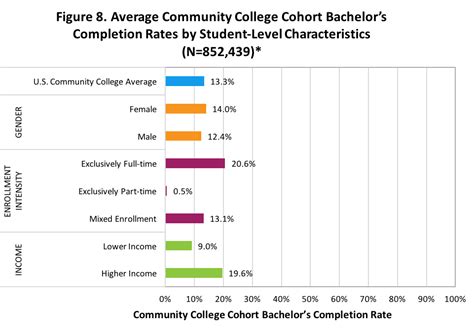Bachelor's Degree: Required Credits And Completion

Getting a Bachelor’s degree is a significant milestone in one’s academic journey. It requires a certain number of credits and completion of specific requirements. In this article, we will explore the details of a Bachelor’s degree, including the required credits and the steps to complete it.
What is a Bachelor’s Degree?
A Bachelor’s degree is an undergraduate academic degree awarded by colleges and universities upon the completion of a specific program of study. It typically takes four years of full-time study to complete, although the duration may vary depending on the field of study and the institution.
Required Credits for a Bachelor’s Degree
The number of credits required to earn a Bachelor’s degree varies depending on the program and the institution. However, a typical Bachelor’s degree program usually requires the completion of around 120 credits. These credits are earned by successfully completing a combination of required courses, elective courses, and other program-specific requirements.
Core Requirements
Core requirements are courses that are mandatory for all students pursuing a Bachelor’s degree. These courses provide a foundation in various disciplines and ensure that students acquire a well-rounded education. Core requirements may include courses in subjects such as English, mathematics, science, social sciences, and humanities.
Major Requirements
In addition to the core requirements, students are also required to complete courses specific to their chosen major. Major requirements vary depending on the field of study but typically include a set of core courses and a selection of elective courses within the major. These courses provide in-depth knowledge and skills in the chosen area of study.
Elective Courses
Elective courses are courses that students can choose based on their interests or to fulfill credit requirements. These courses may be taken within the major or from other disciplines. Elective courses provide flexibility and allow students to explore other areas of interest outside of their major.
Steps to Complete a Bachelor’s Degree
Earning a Bachelor’s degree requires a step-by-step process. Here are the general steps to complete a Bachelor’s degree:
1. Choose a Field of Study
The first step is to choose a field of study or major. Consider your interests, strengths, and career goals when selecting a major. Research different majors and talk to advisors or professionals in the field to make an informed decision.
2. Meet with an Advisor
Once you have chosen a major, schedule a meeting with an academic advisor. An advisor can provide guidance on the program requirements, course selection, and help you plan your academic journey. They can also assist in ensuring you meet all the necessary requirements for graduation.
3. Create a Course Plan
Work with your advisor to create a course plan that outlines the courses you need to take each semester to meet the credit requirements for graduation. A course plan ensures that you stay on track and complete all the necessary courses within the intended timeframe.
4. Register for Courses
Once you have a course plan, register for courses each semester according to the plan. Be mindful of any prerequisites or course sequencing requirements when selecting courses. Registering for courses in a timely manner ensures you secure a spot in the desired classes.
5. Attend Classes and Complete Assignments
Attend classes regularly and actively participate in discussions. Complete all assignments, projects, and exams on time. Active engagement in the learning process is essential for success in each course.
6. Fulfill Core and Major Requirements
Make sure to complete all the required core courses and major courses as outlined in the program requirements. Keep track of your progress and consult with your advisor if you have any questions or concerns.
7. Maintain a Good GPA
Most Bachelor’s degree programs require students to maintain a minimum grade point average (GPA) to remain in good academic standing. Strive to maintain a good GPA by studying regularly, seeking help when needed, and staying organized.
8. Complete Internships or Experiential Learning Opportunities
Some Bachelor’s degree programs may require or offer opportunities for internships or other experiential learning experiences. These experiences provide real-world exposure and enhance your skills and knowledge in your chosen field.
9. Prepare for Graduation
As you approach the completion of your degree requirements, make sure to apply for graduation within the specified timelines. Follow the necessary steps outlined by your institution to ensure a smooth graduation process.
10. Participate in Commencement
Celebrate your achievement by participating in the commencement ceremony. Commencement is a special event where graduates are recognized for their hard work and dedication. Invite family and friends to share in this memorable moment.
Conclusion
Earning a Bachelor’s degree requires the completion of a specific number of credits and the fulfillment of program requirements. By carefully selecting a major, planning your courses, and staying focused, you can successfully complete your Bachelor’s degree and embark on the next phase of your academic or professional journey.
Frequently Asked Questions
1. How long does it take to complete a Bachelor’s degree?
The duration of a Bachelor’s degree program is typically four years of full-time study. However, the duration may vary depending on the field of study and the institution.
2. Can I change my major during my Bachelor’s degree program?
Yes, it is often possible to change your major during your Bachelor’s degree program. However, it may affect the number of credits required and the time it takes to complete the degree. Consult with your academic advisor before making any major changes.
3. Are online Bachelor’s degree programs available?
Yes, many colleges and universities offer online Bachelor’s degree programs. Online programs provide flexibility for students who may have other commitments or prefer remote learning. Make sure to choose an accredited online program.
4. Can I transfer credits from another institution?
Yes, it is often possible to transfer credits from another institution. Transfer credit policies vary by institution, so it is important to consult with the admissions office or registrar’s office of the institution you plan to attend.
5. What can I do with a Bachelor’s degree?
A Bachelor’s degree can open up a wide range of career opportunities depending on the field of study. It can also serve as a foundation for further education, such as pursuing a Master’s or Doctoral degree.

